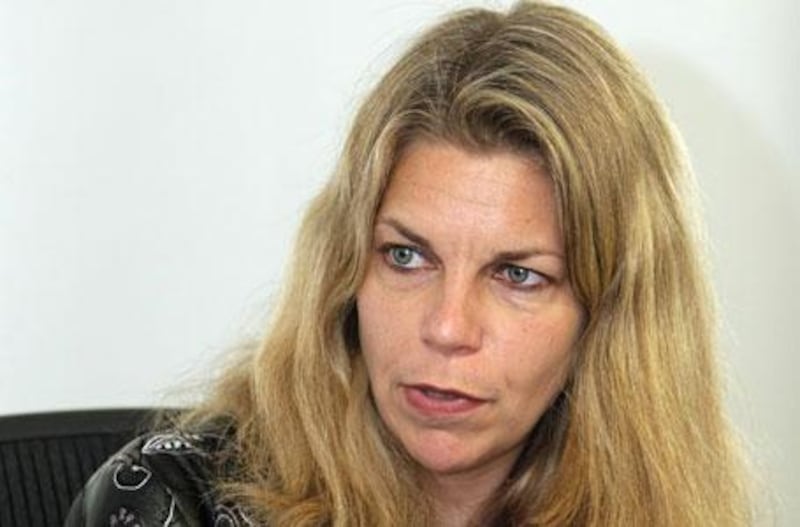ABU DHABI // Gathering the world's most capable renewable energy specialists in Abu Dhabi will be the top priority for the woman in charge of the International Renewable Energy Agency (Irena). Hélène Pelosse, Irena's first director general, arrived at her new post on Monday and said she was "very impressed" with Masdar City, the world's largest carbon-neutral development, being built on the outskirts of Abu Dhabi.
"We need to attract the best people in the world to come and settle here and start work," she said at a media briefing. "We can show the world that [adopting renewable energy] is feasible and it is going to happen." Ms Pelosse, who was elected Irena chief on June 30, hours after Abu Dhabi won the agency's headquarters, has wasted no time in putting down roots. She already has viewed several buildings in the capital with a view towards choosing a temporary home for Irena until 2011, when it will move into its "green" headquarters in Masdar City.
The temporary headquarters will be officially inaugurated after Ramadan this year. "Irena is the agency which will face and tackle the biggest challenge of the 21st century, which is climate change and energy," Ms Pelosse said. The agency will initially have a staff of approximately 120 people, recruited from international research institutions, non-governmental organisations and governments around the world. That number will rise to 250 when the organisation is fully set up.
"The Emirates did a very good bid for Irena," Ms Pelosse said. "What makes it unique is the link with Masdar City. ... I am very impressed by what is going on here." Abu Dhabi is covering the expenses of the headquarters, plus offering 20 full scholarships for Irena-recommended students at the Masdar Institute, which has been developed with the Massachusetts Institute of Technology in the US. There is also US$135 million (Dh500m) of in-kind and cash support to help the agency until 2015. That is in addition to an annual US$50m from the Abu Dhabi Fund for Development, which would support Irena-endorsed projects in developing nations over seven years. Ms Pelosse met officials from the fund yesterday.
Before being elected chief of Irena, Ms Pelosse worked in a French ministerial office that handled ecology, energy and development. She also managed the French negotiations for the European Union's Climate and Energy package, focusing in particular on the Renewable Energy Directive, which calls for a 20 per cent renewable energy share in overall EU consumption by 2020. Irena has been formed against the backdrop of increasing international attention on the issue of climate change.
Although a political consensus has emerged about the need to reduce greenhouse gases, there is less clarity on how this should be achieved. Yesterday, the Group of Eight industrialised economies agreed for the first time that they must take steps to limit worldwide temperature rises to no more than 2°C, a threshold for averting dangerous changes to the climate. But critics pointed out that no agreement was reached with developing countries, which will soon be generating the bulk of the world's greenhouse gases. Another issue was the target itself: an 80 per cent reduction by 2050.
None of the politicians that agreed to it is likely to be in office in 40 years' time, raising questions on whether the commitment will be met. No interim targets were agreed upon. The issue is made even more challenging by the varying viability of different renewable energy solutions, depending on geography and climate. Wind energy, for example, has good potential in Britain but not in the UAE, where winds are lighter.
Governments such as France have pushed for nuclear power, which does not generate carbon emissions but generates long-lasting toxic waste and is reliant on finite supplies of uranium. Brazil has been promoting the use of biofuels, but the latest research points to sustainability challenges there, as well. Large users and producers of coal have been advocating carbon capture and storage - a new technology that involves storing carbon dioxide emissions in geological formations.
Ms Pelosse yesterday said carbon capture and storage would not be a priority for the agency. "This is not at all in the mandate of Irena," she said. "It is related to coal and as far as I know, coal is not a renewable energy source," she said. Biofuels, however, will be on Irena's agenda as a solution for poor countries, she added. vtodorova@thenational.ae






